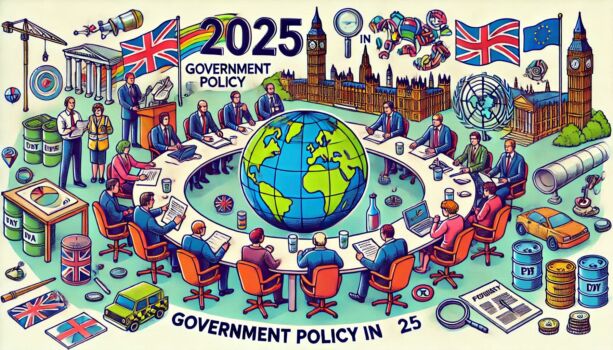2025 Predictions: Policy & Regulation
by Mathew Broughton on 2nd Jan 2025 in News

As with all industries, government regulation across the globe is set to have a critical impact on the advertising industry throughout 2025.
From updates to privacy legislation, affecting targeting and the use of consumer data, through to new laws governing the reporting of carbon emissions, staying up to date with decisions from various administrations is vital.
To that end, we asked industry expert how current and upcoming policies are set to impact the market through 2025.
Shockwaves, slumbers, and grafters

2025 will be a big year for regulators, businesses, and grafters:
- Competition regulators will continue squabbling with big tech. The DMA and DSA will start to show their teeth. The CMA might put an end to its frustrating Sandbox investigation. The DOJ cases against Google will produce shockwaves while having no short-term impact whatsoever.
- Publishers will likely resolve their cookie consent uncertainty while the battle against copyright-infringing AI models intensifies.
- On the privacy front, the UK Parliament will pass the near-inconsequential Data (Use and Access) Bill. The ICO might approve the first certification scheme for ad tech, paving the way for a pan-European set of rules that we can get our head around.
- By contrast, the US government will fall back into the privacy and competition enforcement slumber of the pre-Kahn era. Meanwhile, X will merge with Truth Social to become the White House’s official media channel.
Mattia Fosci, CEO, Anonymised
Time running out on emissions reporting

The Corporate Sustainability Reporting Directive (CSRD) kicks in on January 1, 2025, and many companies might not be ready. By then, businesses need to report detailed emissions data—but the prep work for that should’ve already been happening in 2024. This isn’t just a European matter; it applies to any company making over €150m (£124m) in net EU revenue, no matter where they’re based. The real challenge? Many still don’t grasp the environmental impact of advertising, even though it plays a key role in shaping a company’s sustainability story. Time is running out, and those who don’t act risk more than non-compliance—they miss a chance to show leadership and meet the growing demand for greener, more responsible practices. The good news? Starting now gives companies a real opportunity to get ahead.
Ott Heidmets, CEO, Nexd
A CSRD scramble

With environmental reporting requirements looming large at the start of 2025 as part of the regulations surrounding the Corporate Sustainability Reporting Directive (CSRD), I predict we’re going to see a scramble at the start of next year as companies struggle to get to grips with the new rules. Just as many companies struggled to comply with GDPR regulations at the start, I think we'll have a similar situation with CSRD. Despite two-thirds saying they are confident they will be ready, less than half have completed key activities, with many still favouring spreadsheets over specialist tools or technology. But despite the uncertainty, the CSRD, along with the launch of the Global Media Sustainability Framework, are positive steps in the right direction following the hottest year on record, holding marketing stakeholders accountable and leaving no room to step back from addressing energy consumption and greenhouse gas emissions within the sector."
Audrey Danthony, founder and chief product officer, Impact Plus
Unchanged trajectory, greater results

Although Google's decision to keep third-party cookies may appear to be an about-turn, the trajectory remains unchanged. Empowering consumers to make their own choice over third-party identifiers will hasten their demise. As signal loss accelerates, advertisers are rethinking their playbooks. No longer can they depend on invasive tracking and granular hyper-targeting. Instead, they are turning to privacy-respecting approaches such as zero-party data. This data - shared directly and willingly by consumers through tools like surveys - offers a powerful alternative, giving brands insights into preferences and intentions while fostering trust through transparency.
While some worry that the fading viability of identifiers will make campaigns less efficient, the opposite is true. In 2025, marketers who will shift from hyper-targeting based on identifiers towards a new model, based on the hybridisation of old-school solutions with new data sources, will see even greater results while prioritising privacy.
Raphael Rodier, chief revenue officer, Ogury
AntitrustPrivacyRegulationSustainability









Follow ExchangeWire